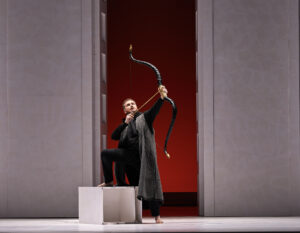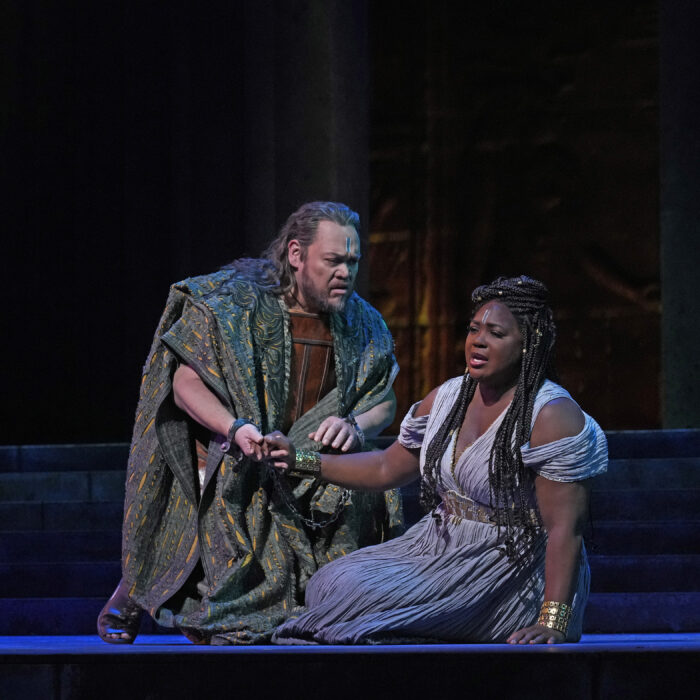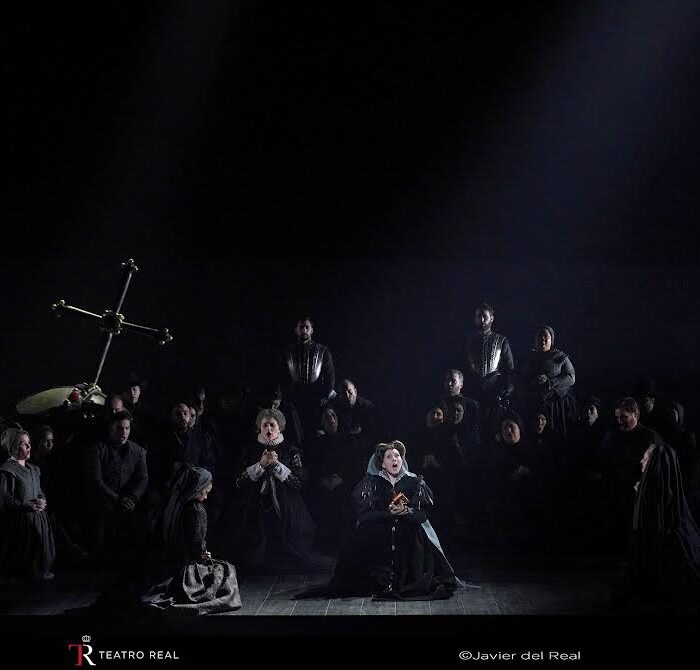
Ravenna 2024 Review: Il Ritorno Di Ulisse In Patria
Dantone’s Musical Direction Shines In Lackluster Staging
By Alan Neilson(Photo: Zani-Casadio)
In his program notes, the director, Pier Luigi Pizzi, writing about “Il Ritorno di Ulisse in Patria,” stated that “the opera speaks for itself,” adding, “we must not induce or force its interpretation… It is up to the audience to confront it, to think about it, and to decide for themselves whether or not it is worthwhile.” Even if we put to one side the fact that any staging requires interpretative decisions, such statements do suggest that the Teatro Alighieri’s production was ducking its responsibility to provide a coherent dramatic framework with which the audience can engage with the work and is failing to offer a reading from which judgements can be made.
A Staging of Few Ideas and Too Little Energy
To be fair to Pizzi, his words were more a statement of intent than a reality, but his lack of intervention in constructing a dramatic staging did significantly undermine the presentation. His concern is always one of aesthetics, and it is, therefore, not surprising that he also takes responsibility for scenery and costume design. The visual is always paramount, even if the clarity of the narrative or the dramatic impact of the drama are not fully realized in the process. He is more concerned with creating a series of beautiful stage pictures, in which the movement of the singers is kept to a minimum in order that the eyes of the audience can take in his delightful creations.
The first time one sees an opera produced by Pizzi, it can be a very interesting and pleasing experience. The second time, the effect is less impressive, and by the third, it becomes somewhat tedious; the pattern is always the same. The scenery tends to be in white with occasional use of gold, grey or black, usually fashioned with a symmetrical simplicity, often referencing classical forms. Props are always kept to a minimum, ensuring there is plenty of space on stage so that he can place the singers in aesthetically agreeable positions. Costumes, again, tend to have classical connotations. The backdrop tends to be lit using single colors such as yellow or red, chosen for their ability to enhance the stage pictures. This was exactly the format adopted for his production of “Il Ritorno di Ulisse in Patria.”
The stage consisted of a white frieze containing three large doors, positioned on a raised platform with three white steps leading down to the floor. Although the doors were opened to allow the occasional exit and entrance of the characters, their primary use, however, was to act as a means of changing the onstage atmosphere through the projection of a colored light onto the wall behind the doors. There were only minimal changes to the basic design; occasionally the frieze would be raised, leaving a flat white wall that was again used for a colored light to dominate the space. There were simple props, including Penelope’s loom, a throne, Ulisse’s boat and a bed, all of which were colored solely in white and were removed as soon as possible to ensure the stage remained uncluttered.
It was, as expected, an aesthetically pleasing set, which Pizzi then enhanced by carefully positioning the characters to create a balanced and sensitively managed scene that rested easy on the eye. Unfortunately, to maintain the effect, any sudden, overly demonstrative or large-scale movement of the cast had to be kept to a minimum, which inevitably led to a fairly static and dramatically constipated presentation. In a literal sense, the opera, indeed, had to “speak for itself,” as visually the staging did little to convey or enhance the drama.
It was, therefore, left to the music to speak for the work as a whole, which, in the hands of the committed and skilled cast and orchestra, overseen by the musical director Ottavio Dantone, managed to compensate, at least as far as it was possible to do so, for the static, low-energy staging.
An Excellent Cast Rises to the Challenge
Baritone Mauro Borgiorni proved to be a heroic Ulisse. His singing was articulate, clear, forceful and passionate. Exuding a strong presence, he stood proudly, fearlessly declaiming his lines and dominating each scene in which he was present. Even when disguised as a slightly stooped shepherd, his heroic presence shone through. His sensitivity to the dramatic situation was carefully displayed in his voice. His neatly crafted embellishments and lively coloratura added beauty and nuance to what was an excellent performance.
It perhaps came as no surprise that the standout performance of the evening came from Arianna Vendittelli in the role of Minerva. The confident soprano sings with an allure that cannot fail to move the emotions. Her tonal beauty and agility, along with the ease with which she is able to embellish the vocal line with delicate trills and subtle ornamentations or deliver passages of complex coloratura are captivating, none of which are undertaken purely for display; rather it is built into her interpretation, focused on the development of her character. Unfortunately, given the static nature of the production, her character did not grip the imagination to the same degree that she achieved in Robert Carsen’s production at the Maggio Musicale in 2021.
Delphine Galou brilliantly captured Penelope’s suffering and grief. Although histrionic outbursts were largely kept in check, the intensity of her feelings was successfully conveyed in an expressively nuanced, subtle performance, in which her detailed use of dynamic and colorful contrasts, sensitively constructed embellishments and delicate accenting revealed her inner pain. Her calm, refined demeanor created distance from the emotional turmoil around her, especially in relation to the suitors trying to force her into marriage, which reinforced her position as a person of noble status.
The king of the gods, Giove, was given a convincing presentation by bass-baritone Gianluca Margheri, who used his agile, resonant and expressively forceful voice to characterize him as dominant and authoritative. His meeting with Nettuno over the fate of Ulisse was expertly wrought by both singers, creating a powerful vocal contest in which the passions of both rose to the surface. He also produced a threatening reading of Tempo, in which he was dressed as the Grim Reaper.
Tenor Valerio Contaldo was certainly a heroic Telemaco. Unfortunately, however, his acting was far too one-paced to convince. Everything he did had to be forceful, energetic and confident; when meeting anyone, he could not simply greet them; rather, he had to give them a hard slap on the back and a fierce hug. There were no half-measures, no nuance, and he appeared unable to step back from what was a one-dimensional characterization. The low-key approach from the rest of the cast exacerbated the impression. His singing, however, was of a different order, artfully crafting his lines to promote his heroic personality, which he furnished with a far greater degree of subtlety, depth and detail.
Contralto Margherita Maria Sala as Penelope’s old nurse, Ericlea, proved to be a sympathetic and comforting presence. Although a relatively minor role, she made a very strong impression with her ability to imbue the voice with an array of pleasing colors and emotional depth.
Tenor Žiga Čopi and soprano Charlotte Bowden, playing the young couple Eurimaco and Melanto, produced light, playful performances that caught the spirit of young love. Čopi displayed his fine technique to good effect with his pleasing embellishments and ability to coat the voice with youthful ardor, while Bowden’s lyrically engaging and flirtatious interpretation ensured she was the perfect partner, allowing the two voices to respond to each other with a fresh, youthful energy, underpinned with a suggestive eroticism.
Tenor Robert Burt produced a clearly defined, larger-than-life portrait of Iro; sometimes he was bullying, occasionally cowardly, while at times he played the clown; however, he never went unnoticed. Ultimately, when confronted by Ulisse’s rising anger, he showed Iro’s true pathetic nature by slinking off into the background. Burt made full use of his voice’s flexibility and expressivity to support his characterization.
Federico Sacchi’s low, gravelly bass has a depth and thick, watery quality that made him ideal for the role of the sea god, Nettuno. Even slight accenting or changes to the coloring of the voice enabled him to appear angry, unbending or ruthless. It also allowed him to convince as the dominant suitor, Antinoo.
Countertenor Danilo Pastore was cast in two roles: firstly, as Human Frailty in the prologue and secondly, as the suitor, Piasandro. In both instances, he caught the nature of the character, for which he produced a well-balanced interpretation that brought together characterization and vocal display, expressivity and beauty. If he were not always successful – the movement of the voice was on occasions a little labored – the frisson engendered by his willingness to push himself more than compensated for the fact.
Tenor Jorge Navarro Colorado was under-parted in the role of the suitor Anfinome. He produced a beautifully expressed reading that showed off his sensitive phrasing, secure technique and ability to successfully embellish the vocal line.
Together the three suitors, dressed in colorful costumes, paraded around the stage like three peacocks, exaggerating their movements to expose the superficiality of their words. It was one of the few occasions that Pizzi, at least partially, broke with his static approach, and it worked very well indeed.
Tenor Luca Cervoni caught the attention with his light, carefree presentation of Eumete. He possesses an attractive, lyrically enticing voice that lies easily on the ear.
The small role of Giunone allowed contralto Candida Guida to show off the beautiful colors, agility and expressivity of her voice.
Soprano Chiara Nicastro successfully interpreted the role of Fortuna with a well-sung performance that showed off her tonal beauty.
Soprano Paola Valentina Molinari gave an energetic and clearly defined performance in the role of Amore.
Dantone Leads a Strong Orchestral Performance
The musical director, Ottavio Dantone, produced a masterful reading from the Accademia Bizantina, in which the score’s delicate beauty was sensitively revealed while successfully promoting the work’s dramatic tensions along with the multi-faceted emotions of the characters. There was a pleasing elegance and precision to the sound, underpinned by a sense of freedom that allowed the music to breathe and develop. Musical interludes were wonderfully constructed, and the melodies expertly wrought to draw the audience into the onstage world.
Overall, it was a musical treat; there were so many fine performances, and Dantone’s handling of the musical side of the production was inspiring. Pizzi’s direction, however, seems to truly have hit a dead end. There is only so far one can go with his approach; it might be pleasing to the eye, but it stifles the drama.



